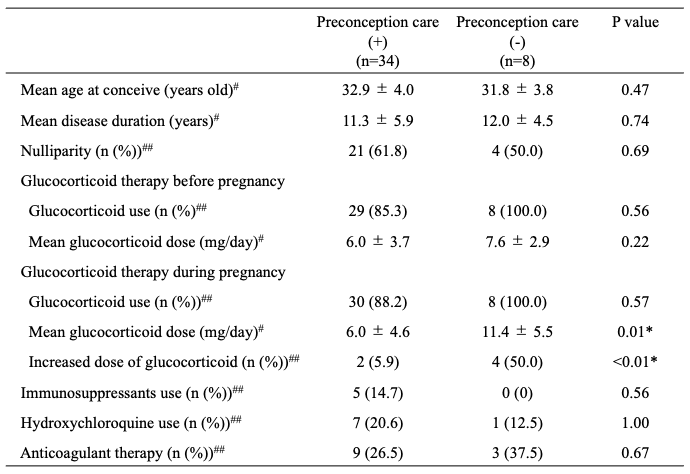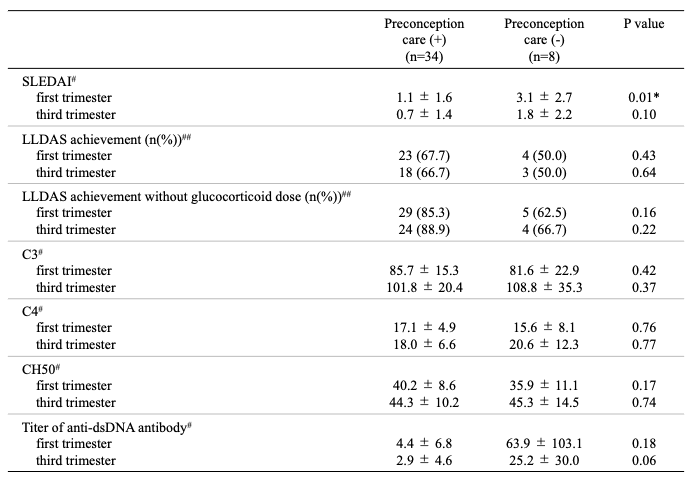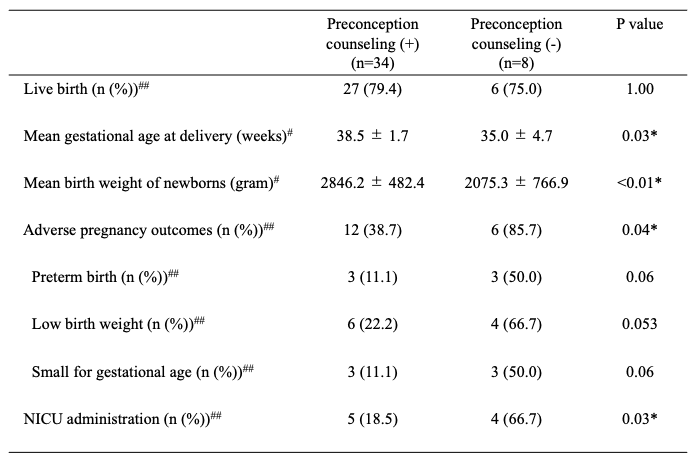Session Information
Date: Sunday, November 12, 2023
Title: (0460–0479) Reproductive Issues in Rheumatic Disorders Poster I
Session Type: Poster Session A
Session Time: 9:00AM-11:00AM
Background/Purpose: Pregnancies complicated by systemic lupus erythematosus (SLE) are known to be at high risk for adverse pregnancy outcomes (APOs). Previous studies have shown that active SLE and/or glucocorticoid use were risk factors for APOs. In American College of Rheumatology guideline for reproductive health, the importance for preconception care has been indicated. However, the evidence of the need for preconception care has not well revealed, especially whether it influences pregnancy outcomes. Therefore, we evaluated the impact of preconception care for SLE patients on pregnancy outcomes.
Methods: We used the data of SLE patients who were managed from the planning for pregnancy to delivery from March 2006 to March 2023 in our institution. Preconception care strategy was defined as all of the following: 1) counseling, 2) contraception and control moderate or high disease activity, 3) assessment of risk factors for maternal and fetal adverse event, 4) change to pregnancy-compatible medications. We retrospectively evaluated the associatio
Results: 42 cases in 30 SLE patients were included in our study. The preconception care strategy was completed in 34 cases (81.0%), while the remaining cases resulted in conceiving before completion of preconception care. In preconception care group, mean glucocorticoid dose and the rate of increasing dose of glucocorticoid during pregnancy was significantly lower than non-preconception care group (Table 1, P=0.01, < 0.01). As for disease activity parameters, only SLEDAI at first trimester was significantly lower in preconception care group (Table 2, P=0.01). However, there was no significant difference in other disease activity parameters between these two groups. Table 3 showed pregnancy outcomes with or without preconception care. Mean gestational age at delivery and mean birth weight of newborns was significantly higher in preconception care group (P=0.03 and < 0.01), and the rate of APOs or NICU administration was significantly lower in these group (P=0.04 and 0.03). The rates of preterm birth, low birth weight, or SGA tend to be lower in preconception care group (P=0.06, 0.053, and 0.06).
Conclusion: In SLE patients, completing preconception care strategies improved pregnancy outcomes, by reducing glucocorticoid dose during pregnancy and controlling disease activity, especially in SLEDAI. Preconception care is an important therapeutic strategy for SLE patients who hope to pregnancy.
To cite this abstract in AMA style:
Shimada H, Mino R, Wakiya R, Nakashima S, Miyagi T, Ushio Y, Sugihara K, Mizusaki M, Chujo K, Kagawa R, Yamaguchi H, Kameda T, Dobashi H. Appropriate Preconception Care Improves Pregnancy Outcomes in SLE Patients [abstract]. Arthritis Rheumatol. 2023; 75 (suppl 9). https://acrabstracts.org/abstract/appropriate-preconception-care-improves-pregnancy-outcomes-in-sle-patients/. Accessed .« Back to ACR Convergence 2023
ACR Meeting Abstracts - https://acrabstracts.org/abstract/appropriate-preconception-care-improves-pregnancy-outcomes-in-sle-patients/



